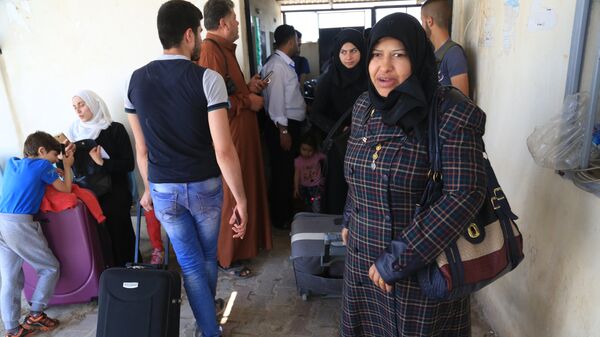Turkey has accepted almost 3 million Syrian refugees since the outset of the conflict on its southern border, more than any other country. However, according to local statistics, most of those who have taken refuge in Turkey now reside outside the territory of the refugee camps, in cities and towns all over the country. Local media report an increase in conflicts and brawls between the Syrian asylum-seekers and Turkey's native population.
Social media hashtag #Suriyelilersınırdışıedilsin, which calls on the Syrian refugees to leave Turkey, seems to be gaining popularity in Turkey.
Trending in Turkey and now globally hashtag #Suriyelilersınırdışıedilsin calling on Syrian refugees to leave Turkey
— Bassem (@BBassem7) 3 июля 2017 г.
Sputnik Turkiye discussed the reasons behind the increased tensions between the local residents and the refugees with Metin Corabatir, president of the Ankara-based Research Center on Asylum and Migration (İGAM), who also commented on what policies Turkey should pursue in order to tackle this problem.
Metin Corabatir explained that the issue of full-fledged integration of the Syrian refugees into Turkish society was never on Turkey's agenda.
"Turkish authorities had been initially regarding Syrian refugees as temporary phenomenon and have not granted any stable legal status to the asylum-seekers. This forced the migrants to seek for ways of improving their living conditions on their own. This created rivalry between local residents and refugees in a number of spheres," he told Sputnik.
He noted that only 10% of Syrian refugees now reside in the refugee camps, which currently resemble open air jails, from a psychological point of view. The majority of the refugees have moved to the Turkish cities as the camps could not receive all the asylum-seekers due to their limited capacities.
#Suriyelilersınırdışıedilsin Racism with Turkish flavor. Shame on you!
— ibrahim (@ibrahimVIII) 4 июля 2017 г.
The researcher explained why the refugees can't get integrated into the Turkish society: it is not only limited to jobs and education, it includes social and cultural integration as well.
"Of course, these people should be able to receive education while preserving their culture; however this education should also help these people fit into Turkey's mode of life; its culture and traditions," he said.
Meanwhile, lack of knowledge of the local language remains a key obstacle as it impedes understanding and integration. Nongovernmental organizations do very little to assist. Turkey should do more in this respect, he said.
#SuriyelilerSınırdısıEdilsin You can't blame 3 million people for one stupid person. Stop your ugly racisim.
— عَلَاءُ الدِّين (@AlaaAlChalabi) 4 июля 2017 г.
With regards to the increased tensions between Turkish residents and Syrian refugees, Metin Corabatir noted that the Syrians are often being blamed due to prejudice, by those who fail to analyze the circumstances which forced them to leave their home country. The mass media has also played a considerable role in creating tensions, as well as other factors, such as rivalry for cheap labor, cultural and ethnic divisions, and others.
These divisions have become only more noticeable after many Syrians have moved into Turkish cities. Istanbul is now home to the largest number of Syrian refugees among Turkey's cities; other sizable diaspora communities are located Bursa, Mersin and Adana. People tend moving to cities where they can find jobs. Tensions are being incited by divisions at the most mundane levels. These include landowner-tenant squabbles, social and cultural relations, as well as relations between men and women. All of these lay the groundwork for the possibility of altercations.
#SuriyelilerSınırdısıEdilsin
— Ali (@alaoy_9) 5 июля 2017 г.
By asking for this, you wipe out all the favors you've done for the Syrians!!
(Thinking before hurrying)👌🏼
Turkey, he said, should devise a strategy for the protection and integration of migrants; not only Syrians but newcomers from other nations as well.
"Turkey should grant refugees a legal status stipulated in the 1951 Geneva Refugee Convention, which set out the basic rights and freedoms of asylum-seekers. This also applies to other documents where Turkey had put its signature. Migrants should be granted a permanent legal status which will enable them to integrate more quickly into the Turkish economy and Turkish society," he said.
However if they ever return home, these efforts won't be wasted. These people will facilitate the growth and development of their home country, the researcher concluded.


